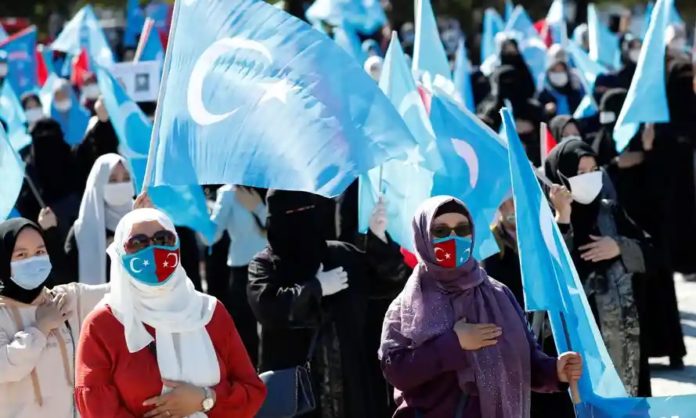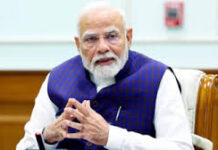Brussels: China is carrying out serious human rights violations in Xinjiang Uyghur Region and these acts “may constitute international crimes, in particular crimes against humanity”, according to a report of the Office of the UN High Commissioner for Human Rights (OHCHR).
The assessment report of human rights concerns in Xinjiang Uyghur Autonomous Region has prompted the European Union (EU) to slam China, saying “civil and political rights are not guaranteed and are in some cases even deliberately systematically violated.”
Xinjiang Region is the native land of ethnic Uyghur Muslims, who call the region as East Turkestan which is under forced occupation of China.
According to the report, the human rights situation in the Xinjiang Uyghur Region calls for urgent attention by the United Nations inter-governmental bodies and human rights system, as well as the international community.
The report, among other things, highlighted existence of a large network of ‘political re-education’ (detention) camps, mass arbitrary detentions and widespread surveillance, tracking and control measures.
It also pointed to the use of forced labour, torture, forced abortion and sterilisation, birth control and family separation policies, and all forms of sexual and gender-based violence.
The report referred to the systemic and severe restrictions on the exercise of fundamental freedoms, including freedom of religion or belief.
Also read: Chinese troops tried to encroach upon Indian territory in Tawang sector: Govt
The EU, a conglomerate of 27 European countries, expressed its persistent and serious concerns over these aspects highlighted by the report.
“The EU underscores the need for justice and accountability and urges China to cooperate with the OHCHR on how to implement the report’s recommendations, and the need for the opportunity for substantive discussion on the human rights situation in Xinjiang, based on the assessment report,” said a statement issued by the European body.
“The EU urges China to abide by its obligations under national and international law to respect, protect and fulfill human rights and fundamental freedoms for all, including Uyghurs and persons belonging to ethnic, religious and linguistic minorities across China, especially in Xinjiang, Tibet and Inner Mongolia,” it said.
“This includes fully respecting the principle of non-refoulement,” the statement said.
The EU called for meaningful, unrestricted and unsupervised access by independent international experts, foreign journalists and diplomats to Xinjiang, Tibet and elsewhere in China.
The EU noted that the estimated number of death sentences and executions in China by far exceeds that of all other countries taken together, and it is also applied in the case of non-violent offences.
It asked China to provide more transparency in the application and imposition of the death penalty and to further reduce the number of criminal offenses punishable by death.
“The EU reaffirms that the death penalty remains an ineffective, unnecessary and irrevocable punishment, and therefore urges China to introduce a moratorium on executions and ultimately abolish this inhuman practice,” the statement said.
“Equally of serious concern is the intensified crackdown on human rights defenders, human rights lawyers, journalists, independent reporters, other media workers and intellectuals,” it said.
“The EU urges China to ensure full respect for the rule of law, ensure fair trial and due process guarantees and to investigate thoroughly reported cases of arbitrary detention, torture, inhuman or degrading treatment or punishment, and harassment of human rights defenders and their families,” the statement said.
“Those detained should be guaranteed access to lawyers of their own choice, medical assistance and their family members,” it said.
“China should stop the practice of residential surveillance at a designated location (RSDL) which has been condemned by the UN Special Procedures, as well as discontinue the use of torture inhuman or degrading treatment or punishment of detained persons to extract forced and public confessions.
“The freedom of expression and access to information have been increasingly severely suppressed in China by means of censorship, intimidation and surveillance of journalists and media workers.
“Foreign journalists and media workers in China continue to face harassment, intimidation, arbitrary detention, visa restrictions and surveillance because of their professional activities for not ‘telling the China story well’ but for telling it truthfully.
“The EU and its Member States emphasize the critical importance of freedom of expression and media freedom as vital to good governance.”
“The EU also urges China to respect international law and principles, and respect human rights, including the right to peaceful protest,” the statement said.








